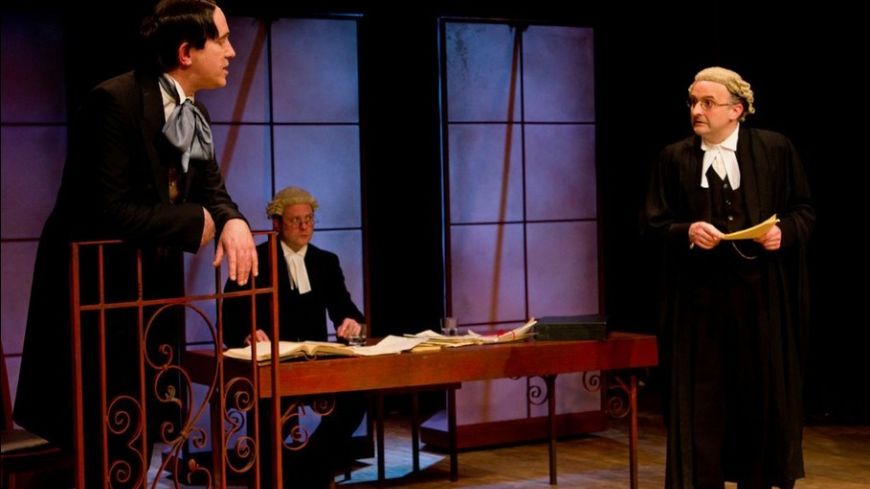
Our legal system is pure theatre; the dramatic world of the Courtroom has always supplied a perfect setting for films, TV and stage.
Fictional crime drama is one thing – a factual court case adds a more gripping element. The truth.
Oscar Wilde, the flamboyant, hedonistic aesthete and wit, whose sparkling Victorian comedies — Lady Windermere's Fan, A Woman of No Importance, An Ideal Husband, The Importance of Being Earnest – are regularly performed today.
But behind the glamour of his theatre success was a private life which would suddenly become extremely public.
“The only thing worse than being talked about, is not being talked about” he once remarked. But now as the subject of gossip and notoriety, it was the start of tragic circumstances brought about by his own superiority complex.
The European Arts Company specialises in reviving classic plays for UK and international touring productions. “The Trials of Oscar Wilde” is co-written by John O’Connor with Merlin Holland, grandson of Wilde and an expert on his life and work.
February 14th, 1895, the first night of "The Importance of Being Earnest". Wilde steps on to the stage at curtain call to thank the audience for their rapturous applause.
But pride comes before a fall. We learn about his romantic liaisons with Bosie, (Lord Alfred Douglas), and other gentleman friends, lost letters and the threat of blackmail.
On February 18th, Bosie’s father, the Marquis of Queensberry leaves a calling card at Wilde’s Club addressed to "Oscar Wilde: Posing Somdomite," a misspelling of sodomite. Although his homosexuality was an open secret within theatrical society, he was so outraged by Queensberry's accusation that he sues him for libel.
“I can resist anything but temptation.” Oscar Wilde
The stage is set for the Libel Trial, the dock and a table where Sir Edward Clarke, QC for the Prosecution and Edward Carson, Queensberry’s QC sit with a pile of books and papers. The text for the play is based on the original testimony as recorded at the Old Bailey.
John Gorick portrays Wilde, suave and elegant, dressed in a grey suit, brocade waistcoat, pink carnation in his lapel, neatly waved dark hair.
Despite serious questioning and evidence against him, he is the epitome of calm control. He fires back a volley of witty statements, declaring that as a writer, literature is above morality. Wilde believes he is above the law.
From Libel Trial to Criminal Trial the drama is played out with the eloquence of colourful legal language interspersed with recorded literary extracts and flashback vignettes.
Rupert Mason and William Kempsell play the QCs and no less than thirteen cameo roles. Quick changing costumes and characterisation is, on the whole, well done, but diminishes the authenticity of a factual trial.
The Defence QC leaves the court in the middle of the Prosecution, and a witness Jane Cotter (Mason in bonnet and shawl), is just pure pantomime.
Despite strong performances overall, the direction is unfortunately rather plodding and the pace of the action between scene changes could go up a gear.
What is lacking is a realistic Court Room atmosphere. Background hustle and bustle could perhaps be enhanced through sound effects as effectively used in radio drama.
This is an ambitious play for an extensive UK tour and limited funding for a larger cast, complex set and staging is understandable.
In the central role, John Gorick is impressive as Wilde, with his actorly annunciation and effete mannerisms: “I have no knowledge of the ordinary individual,” he retorts grandly.
But as the Trial ends, as a broken man, he is lost for words.
If only Wilde had taken Bernard Shaw’s advice, pleading with his friend to abandon the libel trial, flee the country for a more tolerant France - and continue to write.
“Experience is simply the name we give our mistakes”. Oscar Wilde
Showtimes
UK tour dates - 3 May to 12 July, 2014. www.europeanarts.co.uk
The Bistro Restaurant at Brunton Theatre is highly recommended for a pre-theatre meal. 1 course, £9.95. 2 courses £ 14.95. 3 courses, £16.95. tel. 0131 653 5250

